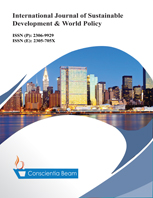The Impact of Technological Innovation, Research and Development, and Energy Intensity on Carbon Emissions: An Experience from BRICS and OECD Countries
DOI:
https://doi.org/10.18488/26.v11i1.2898Abstract
The impact of technological innovation, research and development, and energy intensity on carbon dioxide emissions is examined in this study. A panel data econometric analysis of relevant variables extracted from the OECD and World Development Indicators databases for 36 OECD and 5 BRICS countries from 2005 to 2018 reveals that the Kao panel cointegration test revealed all countries, BRICS countries, and OECD countries exhibited cointegrated relationships regarding the selected variables. At this point, the correlation matrix shows that none of the independent variables has a strong correlation coefficient with the dependent variable. We also used two regression methods to evaluate the long-run association between the study's variables; the two-stage least square (2SLS) and panel generalized method of moments (GMM) both provide similar results, indicating that they are robust. According to the findings, technological innovation and R&D have a positive association with CO2 emissions, but energy intensity has a negative relationship with CO2 emissions.

